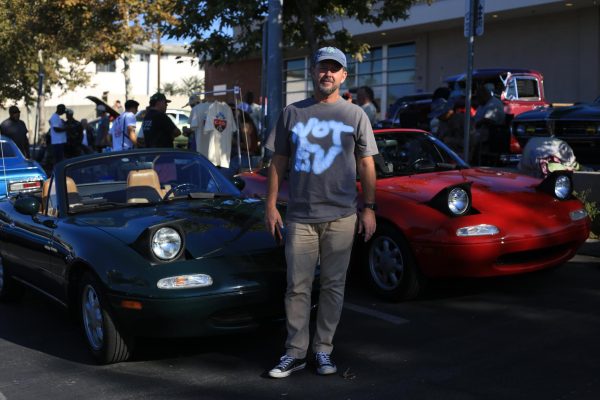Measure asks voters to decide if county board can remove sheriff
L.A. County Sheriff’s Deputy Daniel Padilla is at a station in the city of Industry, preparing for a 10-hour shift.
Should the Los Angeles County Board of Supervisors be able to kick a county sheriff out of office?
That is what Los Angeles County Measure A would allow for, if it’s approved.
Both supervisors and the sheriff are elected positions, so some say it doesn’t make sense to give one group of elected officials authority over another elected official. Supervisors already make decisions on the sheriff’s budget and some worry any additional power could potentially be abused.
Others say this would create more checks and balances on sheriffs who may be elected but go rogue and perhaps do more harm than good. They say since all the supervisors are elected from different districts in the county, they can be trusted with providing that kind of oversight.
The motion to get the ballot initiative started was authored by Holly J. Mitchell, a supervisor for the 2nd district, with Hilda Solis, of the 1st district, co-authoring it.
The motion cites problems with past sheriffs such as Lee Baca, who was imprisoned for obstruction of justice and lying to federal investigators during his term in late 2012 and was investigated by the FBI for it. Supporters of the measure say that corrupt sheriffs should be voted out of office immediately, whether that is by citizens of the county or the board of supervisors or both.
“For decades, the current system has allowed abuses of power to thrive largely unchecked with serious consequences for public safety,” Mitchell said in a press release about the measure.
Local media outlets have been reporting tensions between current supervisors and Sheriff Alex Villanueva over the past few years, especially over injuries, deaths, and other problems in local prisons and jails and sheriff’s deputies who participate in groups that effectively operate as gangs. Villanueva has also been accused of targeting his critics with investigations.
For instance, Villanueva opened an investigation into Supervisor Kuehl and Patti Giggans, both of who have been big critics of the sheriff and are friends. The investigation involved a contract from Metro to a nonprofit Giggans runs. California’s attorney general took over the investigation late last month after sheriff’s deputies raided their homes.
And after L.A. Times reporter Alene Tchekmedyian exposed what appeared to be a cover-up by the department of an incident in which a deputy sheriff kneeled on the head of a handcuffed inmate, Villanueva briefly opened an investigation on her.
Villanueva is up for re-election this November, and is running against former Long Beach Police Chief Robert Luna.
Some people worry that giving the power of removing a sheriff to the board of supervisors can cause safety issues for the community and politicize the process, especially if it comes at a time when some supervisors are up for re-election.
Ellie Perez, 29, who lives in Highland Park, said she is ambivalent and undecided when it comes to giving the power to the board of supervisors to remove a sheriff.
“I think that we should only give the board the power to rid the sheriff if there is some backup plan because giving them too much power is not OK. Yeah, they might have the right tools to do what they need to do to get rid of a corrupt sheriff and bring in someone new, but now we are [effectively] giving them the power to bring in someone that fits them” or perhaps their agenda, Perez said. “I also think we [as citizens] should have the power to vote… Citizens should also have the right to say whether a sheriff is good enough to protect the county; It can not just be all up to the board of supervisors because no one will know what kind of person they would pick and before you know it, it could be too late.”
Perez said the issue matters because whoever is sheriff often helps set practices and sets the tone for sheriff’s deputies in the community, which affect Black and Brown communities disproportionately since they have been targets of police brutality.
Perez said she supports the idea generally because the board may be able to remove a corrupt sheriff and stick to their word when they say they will make things better by perhaps bringing someone in who is really going to help the community.
James Mendez, who lives in City Terrace, worries the board could have too much power when it comes to choosing and voting out a sheriff, especially if there are supervisors at some point who are overly influenced by special interests.
He said, “I think the power to remove the sheriff should be held with people. If the people on the board are fit to make that [decision], then I think we could [let them], but at the same time, if we give the board this power, can they abuse it?”
This story was cross-published on KCET and PBS SoCal’s websites.









